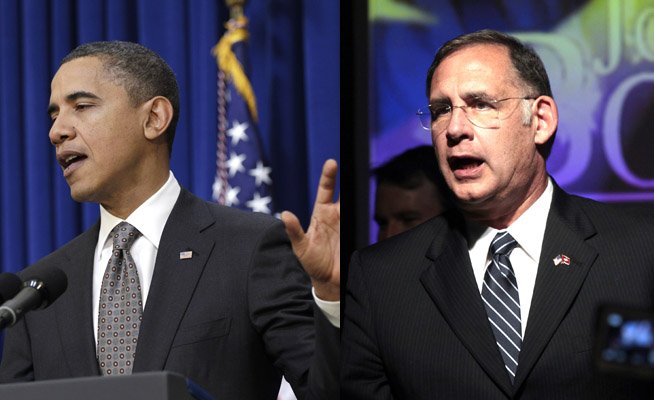WASHINGTON — The phrase “E Pluribus Unum” is engraved on American currency and was a favored slogan of the founding fathers. But since 1956, a group of lawmakers reminded President Barack Obama on Monday, the United States’ official national motto has been, “In God We Trust.”
A letter sent Monday to Obama from 42 mostly Republican members of the Congressional Prayer Caucus, including Arkansas’ Rep. John Boozman, criticized Obama for referring to “E Pluribus Unum” - a Latin phrase that means “out of many, one” - as the country’s motto in a speech he made on Nov. 10 in Jakarta at the University of Indonesia.
By “misrepresenting” the national motto and choosing the motto that does not refer to God, they wrote Obama, “you are not only doing a disservice to the people you represent, you are casting aside an integral part of American society.”
A succession of modern former presidents, including Dwight Eisenhower, Lyndon Johnson, Jimmy Carter, Ronald Reagan and George W. Bush, preceded Obama in referring to the Latin phrase as the national motto.
In the Jakarta speech, Obama reflected on the diversity of beliefs in both America and Indonesia.
“I believe that the history of both America and Indonesia should give us hope,” Obama told the crowd. “It is a story written into our national mottos. In the United States, our motto is E pluribus unum - out of many one ... our nations show that hundreds of millions who hold different beliefs can be united in freedom under one flag.”
The letter states that not properly identifying the motto, and its reference to God, ignores a cornerstone of American history.
“If we pull the thread of religious conviction out of the marketplace of ideas, we unravel the tapestry of freedom that birthed America,” they wrote.
The phrase “In God We Trust” was first placed on American currency in 1864. Three years earlier, in the early, dark days of the Civil War, Secretary of the Treasury Salmon Chase implored the director of the national mint in Philadelphia to include a reference to God, according to the U.S. Department of Treasury.
“No nation can be strong except in the strength of God,” he wrote. “The trust of our people in God should be declared on our national coins.”
It wasn’t until 1956 that Congress passed a law making “In God We Trust” the official motto.
The phrase “E Pluribus Unum” was included in the Great Seal adopted by the Continental Congress in 1782. It has appeared on coins since 1795 and has been required on all coins since 1873.
Barry Lynn, executive director of Americans United for Separation of Church and State, a Washington advocacy group, called the criticism of Obama “nonsense.”
“This is all part of the far right’s effort to prove Barack Obama is, if not a Muslim, at the very least an atheist,” he said. “They’re trying to discredit his spirituality.”
He added that “E Pluribus Unum” is “an encapsulation of what America is all about. In Jakarta, the president was trying to make that point. The context is important.”
In the Jakarta speech, Obama reflected on the four years he spent as a child in the Asian country. He touched on the country’s rough road to democracy and - in the portion of the speech cited by the caucus - on the nation’s religious diversity.
He told the crowd that he had just visited the Istiqlal mosque, then under construction, “admired its soaring minaret, imposing dome and welcoming space.”
The architect, Obama noted, was Christian.
“Such is Indonesia’s spirit,” he said. “Such is the message of Indonesia’s inclusive philosophy.”
Arkansas’ Boozman said that by referring to the Latin phrase, Obama was voicing a “common misconception.”
But, he said, “it’s important that we speak accurately.” He added that the letter was not “trying to question Obama’s motives” or religiosity.
The letter further states that at three different events this fall, Obama quoted from the Declaration of Independence, saying that Americans have certain inalienable rights, without mentioning that the Declaration identifies the source of those rights.
“Omitting the word ‘Creator’ once was a mistake,” the lawmakers write. “Twice establishes a pattern.”
Added Boozman: “We get those inalienable rights not from government, but from our Creator.”
The White House declined to comment.
Last Friday, delivering a Thanksgiving message to troops in Afghanistan, Obama included a reference to “the Creator” as the source of citizens’ inalienable rights.
Earlier this fall, the national motto was the subject of a lawsuit in federal court.
In September, the Freedom From Religion Foundation, a Wisconsin group that describes its mission as “working for the separation of church and state and to educate on matters of nontheism,” unsuccessfully sued the architect of the U.S. Capitol, Stephen Ayers, for engraving the phrase “In God We Trust” and the pledge of allegiance into the stone at the entrance of the U.S. Capitol Visitor Center.
The group argued that the phrase “excludes and treats as outsiders the millions of Americans” who are not religious. A “reasonable observer” walking into the visitor center “would understand the government to be endorsing religion, including a Judeo-Christian perspective, while discouraging non-belief,” the group wrote.
U.S. District Court Judge William Conley, who serves in the Western District of Wisconsin, ruled the group did not have standing as a taxpayer to sue.
Front Section, Pages 1 on 12/07/2010
